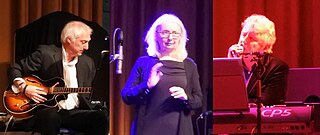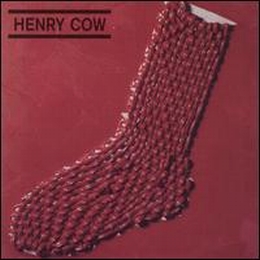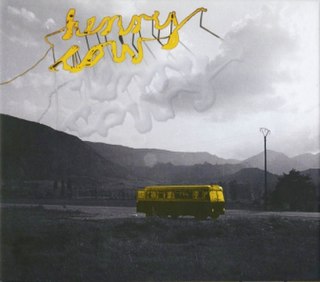Related Research Articles

Henry Cow were an English experimental rock group, founded at Cambridge University in 1968 by multi-instrumentalists Fred Frith and Tim Hodgkinson. Henry Cow's personnel fluctuated over their decade together, but drummer Chris Cutler, bassist John Greaves, and bassoonist/oboist Lindsay Cooper were important long-term members alongside Frith and Hodgkinson.

Slapp Happy was a German/English avant-pop group, formed in Germany in 1972. Their lineup consisted of Anthony Moore (keyboards), Peter Blegvad (guitar) and Dagmar Krause (vocals). The band members moved to England in 1974 where they merged with Henry Cow, but the merger ended soon afterwards and Slapp Happy split up. Slapp Happy's sound was characterised by Dagmar Krause's unique vocal style. From 1982 there have been brief reunions to create an opera called Camera, record the album Ça Va in 1998, and perform shows around the world.

The Henry Cow Legend is the debut album of British avant-rock group Henry Cow. It was recorded at Virgin Records' Manor studios over three weeks in May and June 1973, mixed in July 1973, and released in September 1973.

Unrest is an album by British avant-rock group Henry Cow, recorded at Virgin Records' Manor studios in February and March 1974. It was their second album and was released in May 1974. It was their first album including oboe and bassoon player Lindsay Cooper, who replaced saxophonist Geoff Leigh.

In Praise of Learning is a studio album by British avant-rock group Henry Cow, recorded at Virgin Records' Manor studios in February and March 1975, and released in May 1975. On this album, Henry Cow had expanded to include members of Slapp Happy, who had merged with the group after the two had collaborated on Desperate Straights in 1974. The merger ended after recording In Praise of Learning when Peter Blegvad and Anthony Moore from Slapp Happy left the group.

Concerts is a live double album by English avant-rock group Henry Cow, recorded at concerts in London, Italy, the Netherlands and Norway between September 1974 and October 1975. Sides one and two of the LP record consist of composed material while sides three and four contain improvised pieces.

Gravity is a 1980 solo album by English guitarist, composer and improviser Fred Frith from Henry Cow and Art Bears. It was Frith's second solo album and his first since the demise of Henry Cow in 1978. It was originally released in the United States on LP record on The Residents's Ralph record label and was the first of three solo albums Frith made for the label.

Hopes and Fears is the debut album by the English avant-rock group Art Bears. It comprises tracks by Henry Cow, Art Bears's predecessor, recorded at Sunrise Studios, Kirchberg in Switzerland in January 1978, and tracks by Art Bears, recorded at Kaleidophon Studios in London in March 1978.

Henry Cow Box is a seven-CD limited edition box set by English avant-rock group Henry Cow. It was released in December 2006 by Recommended Records and comprises the six original albums Henry Cow released between 1973 and 1979, including those recorded with Slapp Happy. A bonus 3" CD-single was given to advance subscribers of the box set which contains previously unreleased material taken from live performances in Europe by the Orckestra, a merger of Henry Cow, the Mike Westbrook Brass Band and folk singer Frankie Armstrong in 1977. The two bonus CD Orckestra tracks were later reissued on the 2019 Henry Cow Box Redux: The Complete Henry Cow bonus CD, Ex Box – Collected Fragments 1971–1978.

The 40th Anniversary Henry Cow Box Set is a nine-CD plus one-DVD limited edition box set by English avant-rock group Henry Cow, and was released by RēR Megacorp in January 2009. It consists of almost 10 hours of previously unreleased recordings made between 1972 and 1978 from concerts, radio broadcasts, one-off projects, events and the studio. Included are new compositions, over four hours of free improvisation, and live performances of some of Henry Cow's original LP repertoire.
"Erk Gah" is a song written by Tim Hodgkinson for the English avant-rock group Henry Cow. "Erk Gah" was performed live by the band between 1976 and 1978, but was never recorded in the studio. Three live performances of "Erk Gah" were later released in volumes 6, 8 and 10 of The 40th Anniversary Henry Cow Box Set in January 2009; Volume 6 was released in advance of the box set in September 2008. In 1993, 15 years after Henry Cow split up, Hodgkinson recorded the composition under the title "Hold to the Zero Burn, Imagine" and released it on his second solo album, Each in Our Own Thoughts (1994).
"Living in the Heart of the Beast" is a 1975 song written by Tim Hodgkinson for the English avant-rock group Henry Cow. It was recorded in 1975 by Henry Cow with Slapp Happy, who had recently merged with Henry Cow after the two groups had recorded a collaborative album, Desperate Straights the previous year. The song was released on In Praise of Learning in May 1975 by Virgin Records. The song's title is a quote from the nineteenth-century Cuban poet and liberation fighter José Martí. "Living in the Heart of the Beast" was the first of two "epic" compositions Hodgkinson wrote for Henry Cow, the second being "Erk Gah" (1976), later known as "Hold to the Zero Burn, Imagine".

The Orckestra were a 12-piece English avant-garde jazz and avant-rock ensemble formed in March 1977 with the merger of avant-rock group Henry Cow, the Mike Westbrook Brass Band and folk singer Frankie Armstrong. They gave two performances in London in March and June 1977, and then embarked on two tours of Europe between September 1977 and May 1978, where they performed in Italy, France and Sweden.

The Virgin Years – Souvenir Box is a three-CD limited edition box set by English avant-rock group Henry Cow. It was released in 1991 by Recommended Records and East Side Digital Records, and contains three albums Henry Cow made for Virgin Records between 1973 and 1975, Legend, Unrest and In Praise of Learning. Included in the box set is a 24-page souvenir booklet and a Henry Cow fold-out family-tree.

Henry Cow: The World Is a Problem is a 2019 book by American academic Benjamin Piekut. It is a biography and analysis of the English experimental rock group Henry Cow and their turbulent existence between 1968 and 1978. The book is Piekut's second and was published in September 2019 in the United States by Duke University Press in both hard- and soft-cover.
"War" is a 1975 song composed by Anthony Moore with lyrics by Peter Blegvad for the English avant-pop group Slapp Happy. It was recorded in November 1974 by Slapp Happy with Henry Cow for their collaborative album, Desperate Straights, but was only released in May 1975 on their second collaborative album, Henry Cow's In Praise of Learning.
"Ruins" is a 1974 instrumental composed by Fred Frith for the English avant-rock group Henry Cow. It was recorded in February and March 1974 by Henry Cow, and released on their May 1974 album, Unrest by Virgin Records.
"Beautiful as the Moon – Terrible as an Army with Banners" is a 1975 song composed by Fred Frith with lyrics by Chris Cutler for the English avant-rock group Henry Cow. It was recorded in February and March 1975 by Henry Cow and Slapp Happy, and released in May 1975 on their collaborative album, In Praise of Learning by Virgin Records.

The Henry Cow Box Redux: The Complete Henry Cow is a seventeen-CD plus one-DVD box set by English avant-rock group Henry Cow; it was released by RēR Megacorp in November 2019. The box set comprises the previously released 2006 Henry Cow Box and the 2009 40th Anniversary Henry Cow Box Set, totalling over sixteen hours. A bonus CD: Ex Box – Collected Fragments 1971–1978 was given to advance subscribers of the 2019 Box Redux, and contains newly recovered and previously unreleased recordings, plus the contents of the 2006 box set bonus CD-single: "Unreleased Orckestra Extract". The 2019 Box Redux plus the Ex Box bonus CD contains all the officially released studio and live recordings of Henry Cow.
"Teenbeat" is a 1973 suite of three instrumentals, "Teenbeat Introduction", "Teenbeat" and "Teenbeat Reprise", by the English avant-rock group Henry Cow. The three pieces were composed by Henry Cow, Fred Frith and John Greaves, and Fred Frith respectively. They were recorded in May and June 1973, and released on Henry Cow's debut album, Legend by Virgin Records in September 1973.
References
- 1 2 Martens, Matthew (October 1996). "Henry Cow". Perfect Sound Forever . Retrieved 26 March 2020.
- 1 2 3 Cutler 2009, p. 6.
- 1 2 3 4 Piekut 2019, p. 68.
- ↑ Masters, Marc (2007). No Wave. Black Dog. p. 334. ISBN 978-1-906155-02-5.
- ↑ Clark, Philip (April 2008). "The Primer: Henry Cow". The Wire . No. 290. p. 42. ISSN 0952-0686.
- ↑ Piekut 2019, pp. 65,75.
- 1 2 "Henry Cow – The Henry Cow Legend". Discogs . Retrieved 23 March 2020.
- ↑ Recommended Records (2019). The Henry Cow Box Redux: The Complete Henry Cow (Box Set liner notes). Henry Cow.
- ↑ Piekut 2019, p. 70.
- ↑ Piekut 2019, pp. 68–70.
- ↑ Stump, Paul (2010). The Music's All that Matters: A History of Progressive Rock. Chelmsford, England: Harbour Books. p. 127. ISBN 978-1-905128-10-5.
- ↑ Smith, Bradley (1997). The Billboard Guide to Progressive Music. Billboard Books. p. 105. ISBN 978-0-8230-7665-9.
- ↑ Hegarty & Halliwell 2011, p. 154.
- ↑ Hegarty & Halliwell 2011, p. 155.
- ↑ Piekut 2019, p. 65.
- ↑ "Peel Sessions: 24/04/1973 – Henry Cow". BBC . Retrieved 23 March 2020.
- ↑ "Henry Cow Chronology". Calyx: The Canterbury Music Website. Retrieved 23 March 2020.
- ↑ Recommended Records (2009). The 40th Anniversary Henry Cow Box Set (Box Set liner notes). Henry Cow.